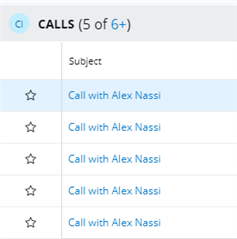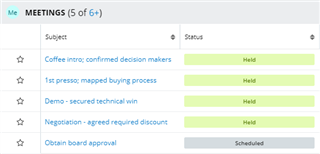When asked to review a customer's usage of CRM, I often start with the basics: how is activity management carried out? Usually, there are clues there as to whether emails/calendars are integrated with CRM, or whether the mobile app is in use to log calls automatically. But something I find most fascinating is how Call / Meeting records are actually named.
For example, check out the blue hyperlinks in this screenshot:

In this example, most Calls / Meetings there is a mix of things that have occurred ("left a message") AND things that are planned ("Review needs") - regardless of status. I know this is demo data - but plenty of live CRMs look like this. Maybe even yours does. Another classic one is the default subjects from things like a mobile app - imagine loading a customer record and seeing the following:

Clearly, this doesn't really help anyone figure out what is going on (..and who'd want to call Alex so many times anyhow!?).... yet this happens so often.
Is there a better way?
Someone should be able to figure out the status of this customer/deal quickly, without even needing to use those handy preview icons. To do that, the names of Calls / Meetings need to be meaningful / clear enough to read and process with ease. No essays, just short phrases. I'd suggest considering the following:
- When a Call/Meeting is planned, make the subject of that activity a description of what you are trying to achieve, e.g. a planned call record called "Book demo and identify audience" is super clear. Nobody needs to click into the Call record to read your actual call plan - they can figure it out just from the subject.
- When the activity has been held, update the subject to now reflect the one line summary of what occurred, e.g. a held meeting record called "Did demo, secured tech approval" is a great summary of status, and while some people may still want to click into the record to see more, many will not need to.
- If an activity is cancelled (e.g. you attempted a call, they weren't available, so you left a voicemail), consider using acronyms consistently to make it easier to pick up the status. There is no real difference between "LVM" and "LM" - what is more important is that everyone uses the same shorthand so it is easier for everyone to know what they are looking at. Consider using dropdowns to help enforce this.
What does this look like in practice?

It may not be perfect, but it works for me!
Those are a few ideas to try - so my question is: what have you found is a good practice for how to name the Calls / Meetings? Any particularly good examples / approaches? Or feedback on the above?
